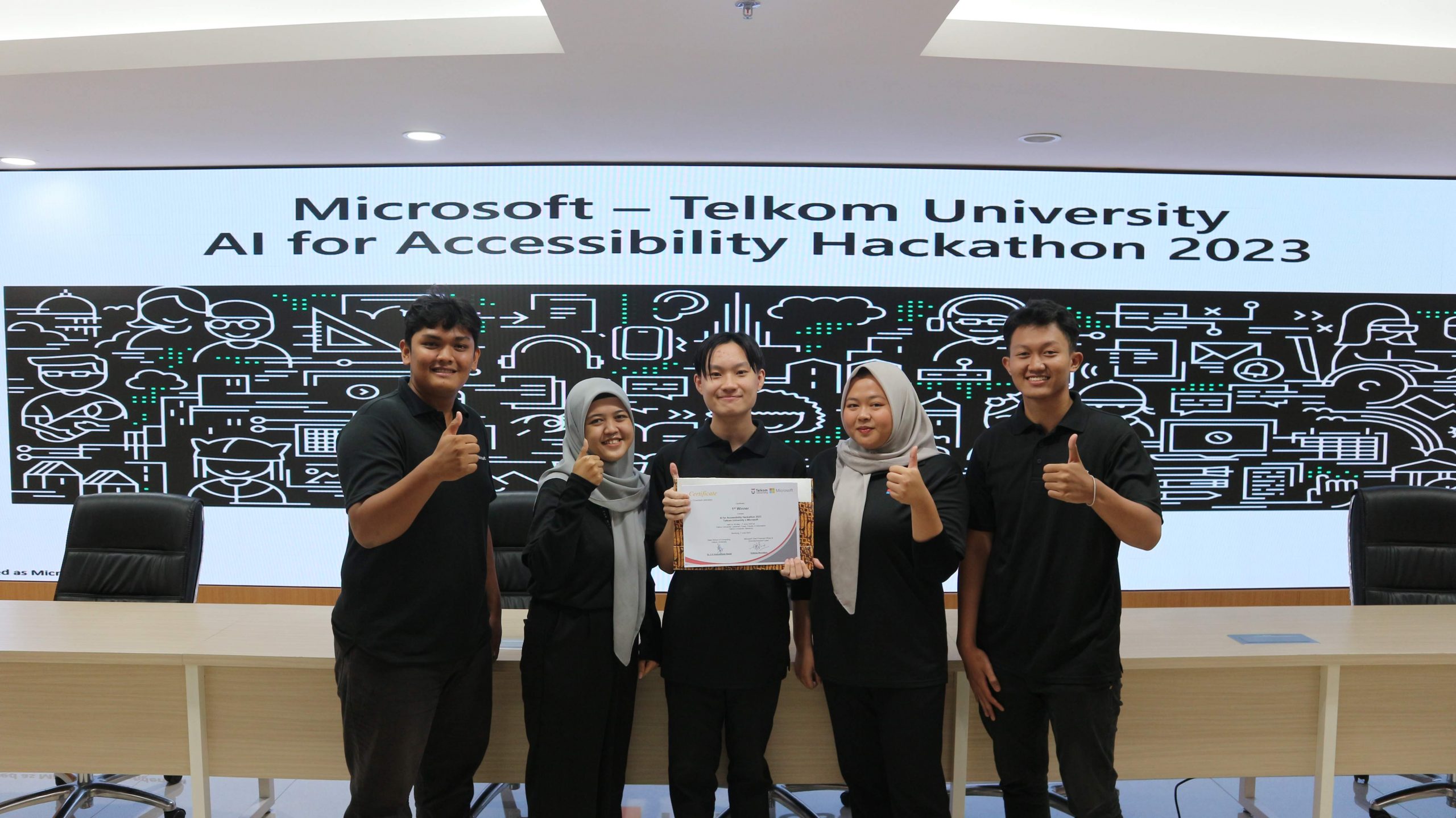(L-R): Lavio Putera Arya Sitanggang, Salsabila Diah Putri Andany, Fernando Manuel, Aida Liana Febiansyah, Bagus Priambudi
Bandung, 22 June 2023 – Microsoft and Telkom University have just wrapped up their AI for Accessibility (AI4A) hackathon. As many as 26 teams of Telkom University students across different majors participated in solving real-world challenges faced by people with disabilities–from daily life, work, to communication–with the help of AI. The ‘Katakan AI’ (translates to ‘Say AI’) team emerged victorious, and were awarded Azure credits, support from Microsoft technical experts, and assistance to develop their idea on Microsoft Azure.
‘Katakan AI’ is an idea by five Telkom University students to help deaf friends communicate more seamlessly in virtual meeting rooms. The idea is designed in two architectural forms. First, as a standalone ‘Katakan AI’ desktop and mobile platform. Second, as an extension of the video conference service platform. In total, there are four main features to be developed in ‘Say AI’:
- Voice to text (Indonesian). Here, AI will be used to develop a speech-to-text translation system, so that deaf friends can understand what hearing friends are saying by reading the translated text of their speech.
- Sign language interpreter (hand gestures). Utilizing a camera or motion sensor connected to a virtual meeting platform, AI can recognize the hand movements of deaf friends and convert them into text and/or speech that hearing friends can understand.
- Chatbot to find unknown vocabulary. With the ability to provide definitions, synonyms, or examples of words that are uncommon or difficult to understand, this chatbot can help deaf friends to find and understand the terms they don’t understand when reading the voice-to-text’s translated text more easily and quickly.
- Automatic media captions and subtitles. AI can provide automatic captions and subtitles from the media used in virtual meetings, such as presentation slides, videos, and other supporting media.
“There are more than 1 billion people with disabilities worldwide, with around 650 million in Asia. Many of them need assistive technology, but only 1 in 10 have access to the technology they need. That is why we are very excited to have our AI for Accessibility hackathon event, in collaboration with Telkom University. There are many fresh idea that can be finalized and actioned further, which could bring us one step closer to realizing a more inclusive world – especially for our friends with disabilities,” said Krishna Worotikan, Chief Financial Officer and Diversity & Inclusion Lead Microsoft Indonesia.
In line with Krishna, Dr. Z.K. Abdurahman Baizal, S.Sc., M.kom, Dean of the Faculty of Informatics Telkom University said, “We are very proud of our students’ creativity. They are able to come up with new perspectives to help people with disabilities. In Indonesia, Statistics Indonesia (BPS) 2020 data showed that there are 22.5 million people with disabilities. This figure is equivalent to approximately 5% of the total population. We believe that innovation and idea coming from events such as the AI4A hackathon can be a good enabler to create an inclusive world for all. Thank you to all participants who have devoted their time and thoughts to participate in solving challenges for our friends with disabilities, and proficiat! You all are winners in accessibility.”
Apart from ‘Katakan AI’, which emerged as the winner, several other ideas also received special awards. For example, the idea of a smart walking stick for people with vision disabilities, an AI-powered makeup app that can help people with vision disabilities to increase their self-confidence and independence when applying makeup, and more.
Ni Komang Ayu Suriani, Founder & CEO of Difalink, who contributed to the success of this program by becoming one of its partners, said, “We at Difalink applaud the ideas provided by the students. There are plenty of innovative ideas, which we hope could be realized in the future, to empower more and more of our friends with disabilities. We believe these ideas can be a good start to embracing inclusivity in Indonesia, especially for people with disabilities.”
###

